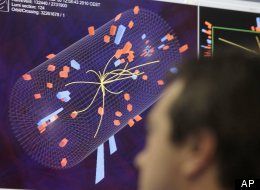
FILE - In this March 30, 2010 file photo a scientist looks at the
pictures of the first collisions at full power at the CMS experience
control room at the European Organisation for Nuclear Research
(CERN) in Meyrin near Geneva, Switzerland. The head of the
world's biggest atom smasher is claiming discovery of a new
particle that he says is consistent with the long-sought Higgs
boson known popularly as the "God particle" which is
believed to give all matter in the universe size and shape.
(AP Photo)
The cosmological implications are hotly debated. Can God fit in a scientific story of creation?
The answer is "no" for Lawrence M. Krauss, an Arizona State University theoretical physicist. He argued in Newsweek that the Higgs boson discovery "posits a new story of our creation" independent of religious belief.
"Humans, with their remarkable tools and their remarkable brains, may have just taken a giant step toward replacing metaphysical speculation with empirically verifiable knowledge," he wrote
Vatican astronomer Guy Consolmagno argued in a Washington Post column that scientifically deduced universal laws expose "the personality" of God. "The mysteries revealed by modern science are a constant reminder that reality is bigger than our day-to-day lives," he wrote.
Read more here. Recommend this post
The term "God Particle" came from the book "The God Particle / If the Universe is the Answer, What is the Question?," by Leon Lederman & Dick Teresi (first published in 1993 and reissued in 2006), which is in the bibliography of my free ebook on comparative mysticism.
ReplyDeleteIn his 2006 Preface Dr. Lederman, a Nobel laureate in physics, wrote:
Now as for the title, The God Particle, my coauthor, Dick Teresi, has agreed to accept the blame. I mentioned the phrase as a joke once in a speech, and he remembered it and used it as the working title of the book. "Don't worry," he said, "no publisher ever uses the working title on the final book." The title ended up offending two groups: 1) those who believe in God and 2) those who do not. We were warmly received by those in the middle.